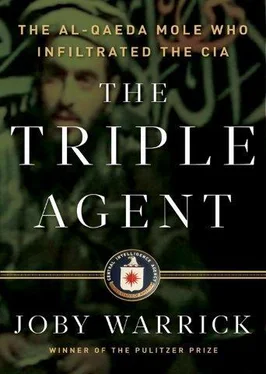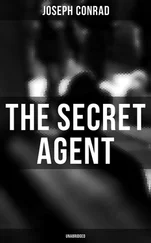The commandos from both birds then clambered over the walls into the main courtyard, only to come under automatic rifle fire. One of bin Laden’s protectors who lived in the compound had been roused from his bed by the commotion and began spraying bullets in the direction of the black-clad figures pouring over the walls in the dark.
The Americans with their night-vision equipment quickly overwhelmed the defender, killing the shooter and a woman who was caught in the crossfire. Two other men were killed as the commandos stormed the main building, including one later described by U.S. officials as an adult son of bin Laden.
The minutes ticked by, and still the SEALs had seen nothing of the man they were seeking. The commandos scoured the compound in two teams, one of which began methodically clearing the rooms on each floor of the main house. From that moment and continuing for what seemed like hours, the TV monitors in the Situation Room essentially went dark.
“Once those teams went into the compound, I can tell you that there was a time period of almost twenty or twenty-five minutes where we really didn’t know just exactly what was going on,” Panetta recalled afterward. “There were some very tense moments.”
It would be days before the full details were known about the bloody struggle that ensued on the compound’s third floor. Working slowly to avoid booby traps, one of the SEAL teams picked its way through a maze of barriers on the staircase until they found themselves outside the entrance to the last of three separate living quarters. After breaking the door, the two lead commandos burst into the room in time to see a dark-robed figure charging toward them. One of the men squeezed off a round, and the figure, a woman, dropped to the floor, wounded in the leg. Behind her in the dim light the Americans could perceive a tall man with a long, gray-flecked beard, wearing loose-fitting Pakistani-style pajama pants and kameez tunic. The man was neither cowering nor armed but standing defiantly. SEAL training demanded a split-second judgment. There was no hint of surrender. Was the man wearing a bomb?
The first shot caught the bearded man squarely in the chest. The next one pierced the side of his forehead near the eyebrows, blowing out the front of his skull.
For the listeners at the White House and in Langley, the muted sounds of struggle were impossible to interpret. More minutes passed without a further sign, and then, finally, a male voice came through the speaker.
“Visual on Geronimo,” the voice said, using a prearranged code. Bin Laden’s identity had been confirmed.
Within minutes, the SEALs were safely in their choppers—a third one had been dispatched to replace the broken bird—carrying with them a large cache of computer equipment taken from the compound, as well as bin Laden’s bloodied corpse.
The entire operation had lasted forty minutes. Moments later, when the helicopters crossed into Afghan air space and out of range of Pakistani interceptors, the group in the Situation Room burst into spontaneous applause.
“We got him,” Obama finally said.
The following morning, as millions of Americans awoke to the news of bin Laden’s death, Panetta paused in his Langley office to compose a brief message that would be distributed that day to CIA employees around the world. It was in large part a congratulatory note, commending the agency’s men and women for achieving a goal that had eluded them for nearly a decade.
“Today, we have rid the world of the most infamous terrorist of our time,” Panetta began.
Then, in a somber turn, Panetta paid special tribute to CIA officers who had not lived to see their work bear fruit. “Our heroes at Khost,” he wrote, “are with us, in memory and spirit, at this joyful moment.”
The fight was not yet over, Panetta knew. There would be a new No. 1 at al-Qaeda. Almost certainly, there would be retaliatory attacks, perhaps major ones. But not on this day.
It was a balmy May morning with brilliant streaks of sun, just like the one a year earlier in Arlington, and Panetta allowed himself a moment to bask in the achievement. The world had been made to feel a bit safer, at least for a time, and the quiet pledges made at eight American and Jordanian gravesides had been fulfilled.
“A promise,” Panetta wrote, “has been kept.”
A project of this size is always a collaboration, but in this case there are numerous individuals without whom this book quite literally could not have been written. Some of them are generous colleagues who assisted me in Afghanistan, Pakistan, and the Middle East, sometimes exposing themselves to risk. Others are current and former government officials who shared my belief in the importance of this story. Still others are relatives and spouses of slain officers who gave me their trust and shared precious and often painful memories. Several sources in the latter two groups were extraordinarily generous with their time and insights, meeting with me a dozen times or more. Yet, some of them can never be acknowledged by name because they are restricted from speaking publicly by secrecy rules or confidentiality agreements. To each of them I owe an enormous debt of gratitude.
I have been privileged over the past fourteen years to work for a world-class news organization that nurtures journalists and supports their professional growth. I am grateful to the Washington Post and its editors for granting me a leave of absence to work on this book, and for offering encouragement and support in countless other ways. Special thanks go to Washington Post Company board chairman Donald E. Graham and publisher Katharine Weymouth, who offered personal encouragement along the way, as well as executive editor Marcus Brauchli, managing editor Liz Spayd, and national editor Kevin Merida. I am especially indebted to my immediate supervisors, national security editor Cameron Barr and deputy editor Jason Ukman, for their kindness, patience, and advice. A great many current and former Post colleagues assisted me in this journey, but I am particularly grateful to David Hoffman, Peter Finn, R. Jeffrey Smith, Ellen Nakashima, David Ignatius, Greg Miller, Karen DeYoung, Steve Coll, Bob Woodward, Jeff Stein, Walter Pincus, Robert Miller, Michel du Cille, Rajiv Chandrasekaran, Karin Brulliard, Josh Partlow, Dana Priest, Glenn Kessler, Mary Beth Sheridan, John Pomfret, and David Finkel. Several colleagues and friends read some or all of the manuscript and offered helpful suggestions and feedback, including Cameron Barr, David Rowell, Jeff Leen, and a friend from the clandestine world whose expert advice, unflagging enthusiasm, and extraordinary kindness sustained me through many a rough patch. Many others provided critical technical assistance and insight, including Rita Katz of SITE Intelligence Group, Ben Venzke of IntelCenter, Jarret Brachman, and numerous current and former members of the intelligence and defense agencies of the United States, Jordan, and Pakistan. Suzanne Kelly, a talented author and CNN producer who shared my fascination for this story, is owed special thanks for her ideas, inspiration, and selfless generosity.
I was fortunate to have the help of several extraordinarily talented, hardworking assistants and collaborators both in Washington and abroad. I was ably assisted in Jordan by the ever-resourceful journalist, translator, “fixer,” and occasional hotelier, Ranya Kadri; in Turkey by Mahmut Kaya; in Afghanistan by Hazrat Bahar; and in Pakistan by the indefatigable Haq Nawaz Khan and another Pakistani journalist whose name cannot be revealed for security reasons. I benefited immeasurably from the friendship and assistance of one of print journalism’s great news researchers, the incomparable Julie Tate. My wonderful agent, Gail Ross, together with her partner, Howard Yoon, saw the potential in my ill-formed proposal and guided me through an anxious first foray into the publishing world with grace and good humor.
Читать дальше












